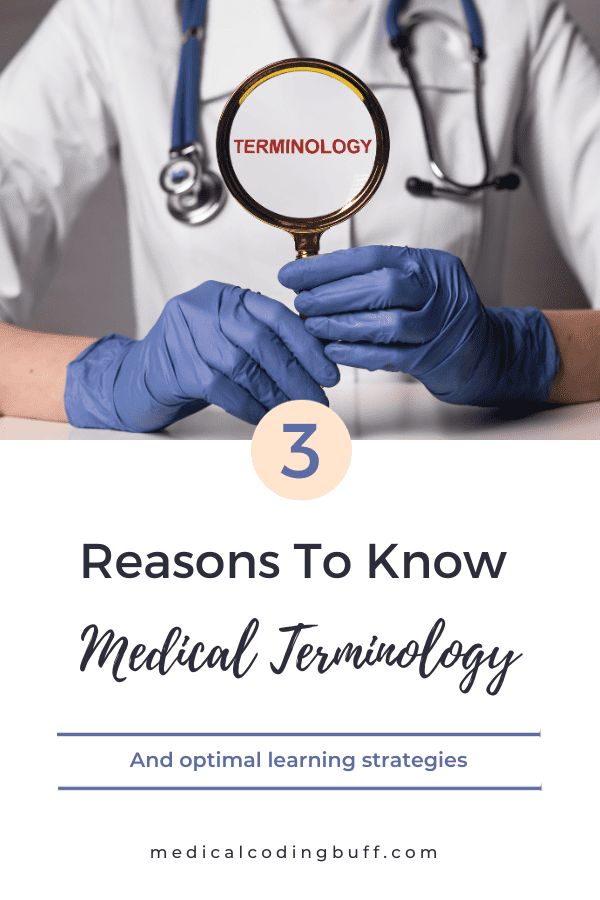3 Reasons To Know Medical Terminology And Optimal Learning Strategies

Medical terminology is a fundamental language in the healthcare industry, and its significance extends beyond physicians and nurses. Professionals like medical coders and billers are essential to the healthcare system, and therefore, it is imperative that they, too, have a comprehensive understanding of medical terminology. This article explores three compelling reasons to know medical terminology and gives you practical strategies for mastering this vital skill.
3 Reasons to Know Medical Terminology
Understanding medical terminology is crucial for maintaining the safety and accuracy of patient care and medical documentation. Here’s why:
- Clear Communication: Effective communication between healthcare providers, medical coders, and billers ensures patient information and treatments are correctly documented. Miscommunication can lead to errors in coding and billing, potentially affecting patient care and reimbursement.
- Precision in Documentation: Medical coders and billers use medical terminology to translate diagnoses and treatments into the appropriate codes for insurance and billing purposes accurately. A solid grasp of medical terminology is essential to prevent coding errors that could lead to claim denials or undercoding.
- Certification Exam Requirement: A strong foundation in medical terminology is a prerequisite for those aiming to attain certifications such as the CPC (Certified Professional Coder) from AAPC. You can expect to be tested on medical terminology as part of the certification process.

Deciphering Complex Medical Terms
Medical terminology can be initially daunting due to its complexity and unfamiliar terms. However, most medical terms can be broken down into manageable components, including roots, prefixes, and suffixes. Learning how to dissect these terms is key to overcoming the challenge. Consider these examples:
“Pericarditis” can be broken down into “Peri” (prefix, meaning surrounding), “card” (root, referring to the heart), and “itis” (suffix, indicating inflammation). Therefore, “pericarditis” means inflammation of the area surrounding the heart.
“Sternocleidomastoid” has three roots: “stern” (referring to the sternum), “cleid” (relating to the clavicle), and “mastoid” (indicating the mastoid process). The vowels (“o”) are combining vowels that make the term easier to pronounce. This term describes a neck muscle that originates in the sternum and clavicle (collarbone) and inserts at the mastoid process.
Effective Learning Strategies for Medical Terminology
The best way to conquer medical terminology is probably the one that works best for you based on your preferences and needs.
Enroll in a Medical Terminology Course
Formal courses, whether in-person or online, offer structured learning with expert guidance. Look for courses from reputable institutions to ensure quality education, such as AAPC and CCO. In these courses, you can expect to learn thousands of medical terms, how to define and pronounce them, and how the terms are abbreviated. In addition, there will be quite a lot of memorization and written work, and you will get a lot of practice using these terms. You may even take a combination course where anatomy is integrated into medical terminology.
CCO offers many different courses related to medical coding and billing, which I can personally vouch for. In fact, I previously enrolled in their Medical Coding Review Blitz course and aced my CPC certification exam on my first attempt.
Invest in a Medical Terminology Textbook
Consider investing in the “Medical Terminology & Anatomy for Coding” textbook authored by Betsy Shiland, as it stands out as an excellent resource for integrating medical terminology with anatomy and physiology. Shiland emphasizes that a solid grasp of specific anatomy and terminology is essential for accurately assigning codes in ICD-10 and CPT, highlighting the critical link between medical terminology, anatomy, and coding proficiency.
Please note that if you choose to purchase Shiland’s book through the provided links, I may earn a small commission at no extra cost to you. Refer to my full disclaimer regarding our affiliate policy for more details.
What sets Shiland’s “Medical Terminology & Anatomy for Coding” apart is its intentional design catering to medical coders. This resource skillfully incorporates medical terminology, anatomy, and physiology with ICD-10-CM and CPT coding guidelines, offering a comprehensive and tailored learning experience.
Although the book is available in paperback or e-textbook format, I personally opted for the e-textbook version, finding it convenient and accessible. Below, you’ll find a screenshot from my e-book displaying a partial Table of Contents.

For insights from others before making your decision, you can read reviews of Shiland’s book here.
Incorporate Fun Learning Techniques
Make your learning journey enjoyable by using quizzes, crossword puzzles, and challenges to reinforce your medical terminology knowledge. These interactive activities can enhance your retention and understanding of complex terms.
Utilize Quick Reference Guides
Quick reference guides can serve as valuable aids during your learning process. They break down common word roots, prefixes, suffixes, and combining vowels, providing examples and system-specific information.
To get your free Medical Terminology Quick Reference Guide — a cheat sheet of sorts — to make it quicker and easier for you to learn these terms., complete the form below.
Conclusion
Medical coders and billers are essential components of the healthcare system, and their command of medical terminology is non-negotiable. Without this proficiency, patient care, documentation accuracy, and reimbursement may be compromised. Therefore, if you are working towards becoming a medical coder or biller, you must invest in learning medical terminology, whether through formal education, textbooks, or engaging learning methods. By doing so, you can ensure your success in healthcare and contribute to the safety and well-being of patients.

Because I am trying to do medical coder
Hi Shagufta,
Yes, medical terminology is a necessity if you are interested in becoming a medical coder. Best of luck to you!
I am interested in medical coding
Hi Bridgett,
I’m glad you have an interest in medical coding. It’s a great career with many challenges! Best of luck to you!
Fixing to finish my CPC course and take my exam.
Hi Sabrina,
That’s great. Best of luck on the exam. You’ve got this!
I scheduled my certification exam for Feb.1st!! Still struggling in some areas but fingers crossed!
Hi Melony,
You have a little time left to make sure you’re ready. If you haven’t taken many timed practice exams, make sure to do that. Take as many as you can until you can score 85% on them. Any areas that you have trouble with, go back and review. Make sure you have your books marked up and you can quickly find the answers. You may want to read my post here where I talk about it.
You’ve got this! Good luck!
I am just turning 50 and looking for a complete career change. Do you think I’m starting out a little to late to start studying to be a medical biller and/or coder?
Hi Becky,
You are not alone, as many people have made career changes at your age, including myself. Think of all the previous experience, knowledge, and insight you bring to the table. If you were going into another type of career, I might not be as confident in saying this. However, medical codes are in great demand, and the profession is expected to grow through 2030. I talk about it in this article.